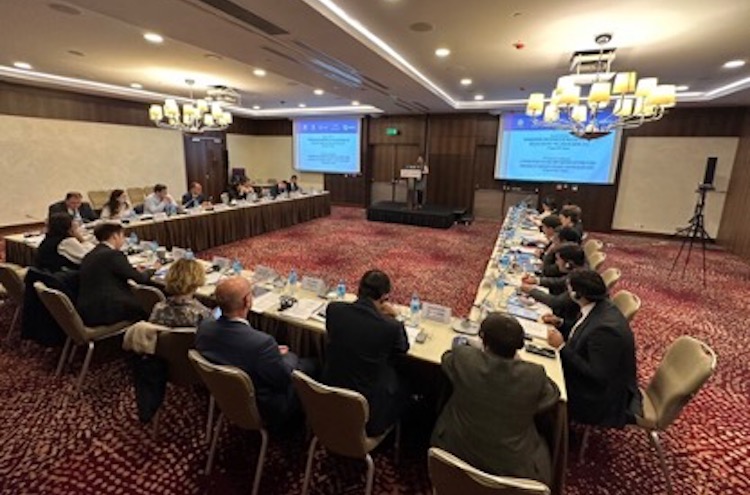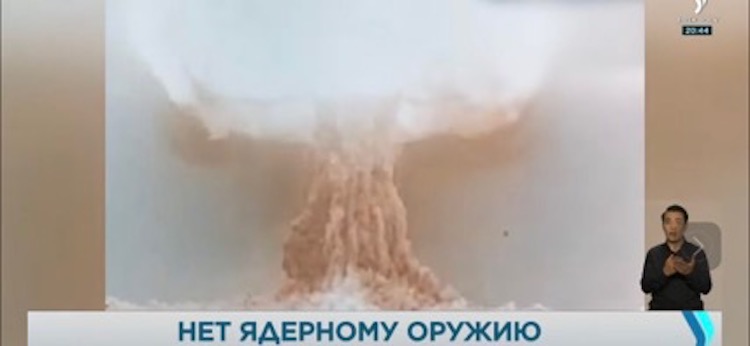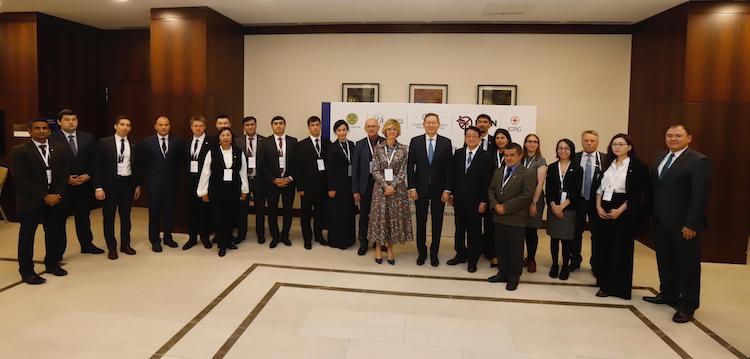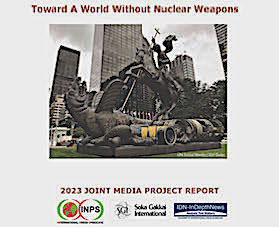By Katsuhiro Asagiri and Kunsaya Kurmet-Rakhimova*
ASTANA. 10 September 2023 (IDN) — The Central Asian Republic of Kazakhstan is playing a key role in implementing the Treaty on the Prohibition of Nuclear Weapons (TPNW)—as the designated president of the third meeting of states parties of the TPNW, and the co-chair of the working group on victim assistance and environmental remediation—alongside another state affected by nuclear tests, Kiribati.
On 29 August, the International Day Against Nuclear Tests, Kazakhstan hosted a regional Conference on “Humanitarian Consequences of Nuclear Weapons and Nuclear-Weapon-Free Zone in Central Asia”.
The conference was co-organized by the Ministry of Foreign Affairs of the Republic of Kazakhstan, the International Committee of the Red Cross (ICRC), the Center for International Security and Policy (CISP), Soka Gakkai International (SGl), and the International Campaign to Abolish Nuclear Weapons (ICAN).
Participants included delegates from the five Member States of the Central Asian Nuclear-Weapon-Free Zone Treaty (Semipalatinsk Treaty), comprising Kazakhstan, Kyrgyzstan, Tajikistan, Turkmenistan, and Uzbekistan—as well as representatives of communities affected by nuclear testing.
Both the venue and date of the conference were of particular significance. The International Day Against Nuclear Tests was selected to commemorate the closure of the Semipalatinsk Nuclear Test Site in Kazakhstan on 29 August 1991.
 The “Humanitarian Impact of Nuclear Weapons and the Central Asian Nuclear-Weapon-Free Zone” regional conference held in Astana on 29 August 2023. Photo credit: Katsuhiro Asagiri, Multimedia Director of INPS Japan.
The “Humanitarian Impact of Nuclear Weapons and the Central Asian Nuclear-Weapon-Free Zone” regional conference held in Astana on 29 August 2023. Photo credit: Katsuhiro Asagiri, Multimedia Director of INPS Japan.
Eighteen years later, in 2009, at the initiative of Kazakhstan, the UN General Assembly adopted a resolution designating 29 August, the day the test site was closed, as the International Day Against Nuclear Tests. With the threat of nuclear weapons being used again becoming a reality, is it possible to achieve a nuclear-free world? What should we know about the threat posed by using and testing nuclear weapons?
Jibek Joly TV channel and INPS Japan interviewed Mr. Karipbek Kuyukov and some participants of the conference on the “Humanitarian Impact of Nuclear Weapons and the Central Asian Nuclear-Weapon-Free Zone, convened by the Ministry of Foreign Affairs of Kazakhstan.
In his opening remarks, Kazakhstan’s First Deputy Minister of Foreign Affairs, Mr. Kairat Umarov, stressed that upholding the norm against nuclear testing and prevention of consequences of nuclear testing remained an integral part of the collective efforts to achieve and maintain a world without nuclear weapons.
Mr. Alimzhan Akhmetov, Director of CISP, Ms. Biljana Milosevic, Head of ICRC Regional Delegation in Tashkent, and Mr. Hirotsugu Terasaki, SGI Director General of Peace and Global Issues, also delivered Opening remarks.
In the morning session, examining the “humanitarian impact” of the use of nuclear weapons, Dmitriy Vesselov, a third-generation victim of nuclear tests, made a powerful testimony about the enormous negative impact of nuclear testing on human health from generation to generation and the social situation in which many Hibakusha have yet to receive relief despite governments efforts.
No nuclear weapons
On 29 August 1949, four years after the U.S. military dropped atomic bombs on Hiroshima and Nagasaki, the first nuclear explosion test was conducted at the Semipalatinsk Nuclear Test Site (the size of Japan’s Shikoku Island or Belgium), which the Soviet government established in today’s northeast Kazakhstan.
The test changed the lives of all Kazakhs, including the residents of Semipalatinsk (now Semey City). Over the subsequent 40 years, 456 nuclear tests, including 25 on the ground and 86 in the air, were conducted on land traditionally considered sacred by the Kazakh people. According to estimates, more than 1.5 million Kazakhs were affected by the radioactive fallout that fell on the surrounding area on the wind.
However, the nuclear tests have had a severe impact on the lives of the victims to this day. The famous Kazakh painter Kalipbek Kuyukov, born without hands after being exposed to radiation in his mother’s womb, is one of the victims of the many health problems caused at the genetic level by exposure to radiation in the vast area surrounding the nuclear test site.
Kuyukov joined the Nevada-Semipalatinsk movement, which played a vital role in the presidential decree for the test site’s closure and conveyed the horrors of nuclear tests through its artworks. He has painted portraits of survivors of nuclear tests, using his lips or his toes to paint them. “I paint them while thinking about those who died in the tests and praying that I can fulfill the mission I have set for myself,” said Kuyukov.
Dmitriy Vesselov, who testified at the regional conference, is a third-generation survivor of the nuclear tests in Semipalatinsk. His grandmother passed away from stomach cancer. He suffers from acromioclavicular dysostosis, characterized by the absence of the collarbone, and his hands are connected only by a few muscles and ligaments, making it impossible for him to do any serious work.
He also has abnormal bone and skull development, making him susceptible to bronchopulmonary diseases and arthritis. “I have a non-fusion of the cervical vertebrae, which means that if I stay upright for too long, the blood vessels supplying my brain and nerve endings begin to compress, and I have to assume a horizontal position. I do not want my children to suffer from this disease. For this reason, I intentionally choose not to have children unless medicine takes a serious step forward and allows me to have healthy children.” said Vesselov.
 Nuclear explosion at Semipalatinsk Nuclear Test Site. Photo credit: Jibek Joly TV Channel.
Nuclear explosion at Semipalatinsk Nuclear Test Site. Photo credit: Jibek Joly TV Channel.
It is estimated that the nuclear weapons detonated at the Semipalatinsk Nuclear Test Site over 40 years were 2,500 times more potent than the atomic bombs dropped on Hiroshima and Nagasaki. Against this backdrop, the conference discussed the importance of not repeating the historical tragedy inflicted by using and testing nuclear weapons due to nuclear confrontation and the importance of supporting today’s victims were discussed at the regional conference.
Mr. Terasaki, SGI Director General of Peace and Global Issues, which co-hosted the regional conference, commented on the event: “I believe that this regional conference is a new milestone, a starting point for representatives from five countries of Central Asia (Kazakhstan, Uzbekistan, Turkmenistan, Kyrgyzstan and Tajikistan) to discuss how we can advance the process toward a nuclear-weapon-free world, given the ever-increasing threat of nuclear weapons.”
When asked about SGI’s cooperative relationship with the Ministry of Foreign Affairs of Kazakhstan, he replied, “SGI is an international organization headquartered in Japan with experience of the atomic bombings of Hiroshima and Nagasaki, but we have established contacts with Kazakhstan on nuclear disarmament issues at various international conferences, and over the years we have co-hosted side events at international conferences on NPT (Nuclear Nonproliferation Treaty) and TPNW (Treaty on Prohibition of Nuclear Weapons) .”
In response to a question about what kind of assistance Kazakhstan could provide to the victims of the nuclear tests as Japan has experienced in assisting Atom-bombing survivors, he said, “I think that Japan’s experience in how the Japanese government and the international community cooperated after the atomic bombings of Hiroshima and Nagasaki may also be a useful reference standard for Kazakhstan.”
He added: However since a scientific basis is inevitably required for each decision, I think that Kazakhstan could take on the challenge of how it can proceed with a rational decision while proceeding with the process carefully, but also quickly providing benefits to those who are suffering now, while gaining the support of the public. I hope that Kazakhstan will take up the challenge in this direction.”
He pointed out that the provisions of Articles 6 and 7 of the TPNW-Treaty on the Prohibition of Nuclear Weapons (requiring state parties to assist victims of nuclear uses and tests and environmental remediation to affected area and international cooperation), which were discussed at the regional conference, are currently under discussion in the international community to advance these provisions, and that Kazakhstan has been appointed as the co-chair (along with Kiribati) of the working group that is at the center of these discussions.”
“In that sense, we will do our utmost to support Kazakhstan in synergistically advancing its challenges while drawing on its experience within the international community,” said Mr. Terasaki.
Mr. Vesselov pointed out that in Kazakhstan, the state provides special medical insurance and benefits to victims of nuclear tests. Still, only those certified as disabled or to one of the family members of a person who died from diseases caused by ionizing radiation. According to this category, he argued, many victims of nuclear testing who are not categorized as handicapped person like himself remain ineligible for assistance.
Asked how he viewed the future, Mr. Veselov commented, “My last name ‘Vesselov’ means ‘Joyful.’ Even with these problems, life goes on, so I will continue to look forward without despair. I hope my testimony will serve as an example of the dangers of nuclear weapons and as a wake-up call to those who talk about the use of small tactical nuclear weapons and limited nuclear war. It is the wish of the victims of nuclear weapons that this terrible scourge will never be repeated anywhere on earth.”
The second meeting of state parties to TPNW will take place at the United Nations Headquarters in New York between 27 November and 1 December this year.
Last year, President Kassym-Jomart Tokayev stated that “nuclear explosions have caused severe damage to the Kazakh land. Such a tragedy should not happen again. Our country will stand firm behind the principles of nuclear security.” [IDN-InDepthNews]
*Katsuhiro Asagiri is President of INPS Japan and Kunsaya Kurmet-Rakhimova represents Jibek Joly (Silk Way) TV Channel.
photo: A Group photo of participants of the regional conference on the humanitarian consequences of nuclear weapons and nuclear-free-zone in Central Asia held on 29 August 2023. Photo Credit: SGI













